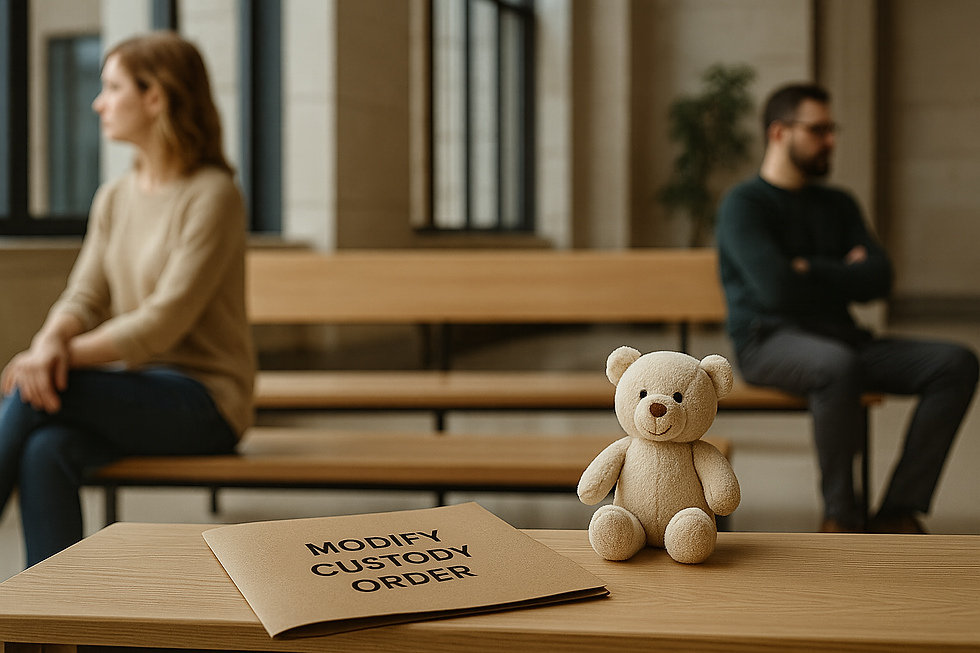Do Grandparents Have Visitation Rights in North Dakota?
- Heartland

- Aug 7, 2025
- 4 min read

When family dynamics change due to divorce, separation, or death, grandparents may worry about losing contact with their grandchildren. North Dakota law does allow for certain rights—but those rights are not automatic. If you’re wondering whether grandparents have visitation rights in North Dakota, the answer is: sometimes, but only under specific circumstances.
This blog breaks down how grandparent visitation works under North Dakota law, when courts may grant it, and what to expect if you're considering filing a petition.
When Can Grandparents Seek Visitation Rights in North Dakota?
Under N.D.C.C. § 14-09-05.1, grandparents (as well as great-grandparents) can petition the court for visitation rights if it is in the best interests of the child and does not interfere with the parent-child relationship.
Common scenarios where visitation may be considered:
One or both parents are deceased
The child’s parents are divorced or separated
The child was born outside of marriage
The grandparent has acted as a caregiver or played a significant role in the child’s life
Grandparents may also have stronger grounds for visitation if they have a long-standing relationship with the child or have served as a primary caregiver for a period of time.
What Does “Best Interests of the Child” Mean?
North Dakota courts always prioritize the child’s best interests when making visitation decisions. This means they’ll consider factors such as:
The emotional bond between the grandparent and child
The child’s age and needs
The stability and consistency of the grandparent’s involvement
The wishes of the child (especially if the child is older or mature)
Whether visitation would disrupt the child’s routine or parental authority
Ultimately, the court must balance the grandparent’s desire for contact with the parent’s constitutional rights to make decisions for their child.

Do Grandparents Need to Go to Court?
Yes—grandparent visitation is not automatic. If a parent denies visitation, a grandparent must file a petition with the district court in the county where the child resides. This is a formal legal process, and the grandparent must prove that:
Visitation is in the best interests of the child, and
It will not interfere with the parent-child relationship.
What the process typically involves:
Filing a written petition and serving the parents
Attending a court hearing
Providing evidence (testimony, letters, photos, etc.)
Waiting for the judge’s decision
You are not guaranteed visitation simply because you’re a grandparent. The court will examine the entire family dynamic before making a ruling.
Can Visitation Be Denied or Terminated?
Yes. Courts may deny or later terminate visitation if it no longer serves the child’s best interests or if it causes conflict between the grandparent and parents. Some reasons visitation may be denied include:
Evidence of past abuse or neglect by the grandparent
Strong objections by both fit, custodial parents
Proof that the grandparent undermines the parent’s authority
Even when a court grants visitation, it can be modified or ended if circumstances change.
Frequently Asked Questions About Grandparents’ Rights in North Dakota
❓Can I get visitation if my grandchild's parents are still married?
Usually not. Courts rarely grant visitation over the objection of two fit, married parents. However, exceptions may apply in extreme cases involving abuse, neglect, or an absent parent.
❓Do I have rights if I raised my grandchild for a time?
Possibly. If you acted as a primary caregiver or had an in loco parentis relationship, you may have a stronger case. The court will consider your role in the child’s life.
❓Can a parent block me from seeing my grandchild without cause?
If both parents agree to deny visitation, it’s very difficult to override their decision. However, you can petition the court and present your case if you believe it’s harming the child.
❓Do I need a lawyer to file for visitation rights?
You’re not required to have an attorney, but family law cases are complex. A North Dakota family law attorney can help you file correctly, gather evidence, and advocate for your rights.
❓What if my grandchild lives on a North Dakota reservation?
Tribal courts may have different rules. Some reservations follow the Indian Child Welfare Act (ICWA), and tribal customs or codes may affect grandparent visitation. If your case involves tribal jurisdiction, you’ll want a lawyer experienced in tribal law in North Dakota.
Real-Life Example (Fictional)
Imagine a grandmother in Minot who cared for her grandchild while the parents were going through a divorce. Once the parents finalize custody, the mother moves to Bismarck and stops all contact. In this case, the grandmother could petition the Ward County District Court for visitation rights—especially if she had a strong emotional bond with the child and consistent involvement over the years.
Get Help Protecting Your Relationship With Your Grandchild

Navigating grandparent visitation cases in North Dakota isn’t easy, especially when emotions run high. At Heartland Law Office, we understand how important these family connections are. We’ll help you explore your legal options, present your case effectively, and work toward a solution that serves your grandchild’s best interests.
Whether you're in Bismarck, Minot, Dickinson, Williston, or anywhere across the state, we’re here to help.
- Call 701-JUSTICE or Visit Our Family Law Page
Additional Resources
This article is for informational purposes only and does not constitute legal advice. Always consult with a licensed attorney regarding your specific situation.





